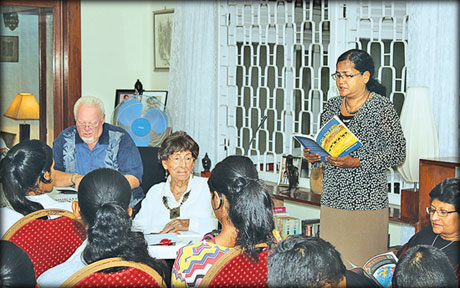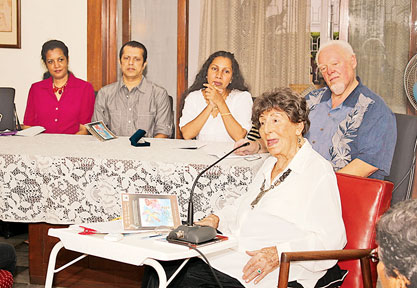Poetry speaks eloquently
by Charith Perera
Poetry is what gets lost in translation-Robert Frost
poem is never finished, only abandoned. -Paul Valéry
Poetry is nearer to vital truth than history. -Plato, Ion
Poets are the unacknowledged legislators of the world. -Percy Byshe
Shelley
 “It is still night “It is still night
Yet the Eastern sky
Is slashed by the first faint
turquoise light
Of dawn. And against the high
Quick paling wheel the birds-
Black and almost static in their
flight
Etched against the opalescence
camber;
And then the opalescent turns
to amber,
Mauve, gold and blue,
And trembling through
A web of colour spun
By mist and dew
Rises the sun”
It was with these beautiful and evocative lines from Anne
Ranasinghe’s poem ‘Colombo’ that the evening of poetry readings titled
‘A Verse Speaking Recital’ commenced at Sri Lanka’s national poet Anne
Ranasinghe’s residence in Colombo. Then the silent poems began to speak
eloquently through the young and the enthusiastic voices of boys and
girls who were the winner of the Sri Lanka Festival for the Performing
Arts.
This year’s focus of the festival was on poetry by Sri Lankan
national poet Anne Ranasinghe. The finals of the Sri Lanka Festival for
the Performing Arts and the award ceremony were held with British High
Commissioner in Sri Lanka John Rankin at the Tourist Board.
Like the famous speech by Mark Anthony at Julius Caesar’s funeral, it
is only when read out loud that poetry begins to speak eloquently. When
the boys and girls rendered their voices to breathe life into poetry, it
begins to speak aloud articulating their intrinsic meanings, diverse
shades of colours and voices which may not manifest reading poetry
silently, in isolation, turning pages at the wink of one’s finger tips.
Emotions
The young performers who recited poetry had not only done justice to
the poems they recited but also articulated subtle emotions in them.
Significantly, each recital, some instance, of the same poem articulated
different tones and voices.
Except two poems, ‘Pike’ by Ted Hugh recited by Abishek Suppiah and
‘A Moment of Madness’ recited by Branavasoruby Sivabalaratnam (own
composition), the rest of the poems recited were Anne Ranasinghe’s
poems. The selection was apt. It was clear that students had not only
byhearted the poems but also were trained well to render their voices to
the verses in a way that brought out scheme of emotions and myriad of
senses of the verses.
Character of a city
David Fonville recited the poem ‘Colombo’ which is one of the
evocative poems by Anne Ranasinghe.
The poet has portrayed the typical character of the city of Colombo
masterly employing visual and auditory images. One of the salient
characteristics of the poem is its use of visual imagery such as
imageries of light and colour. The poet has, in fact, poured colours
into the verse as a talented photographer capturing a character of a
city in a photo-essay.
What is noteworthy in the selection is that the children would
eventually enjoy the sheer beauty of the verse in addition to improving
their skills in speech and performance.
Teachers in general and Adjudicators Philip Thrupp and Jonathan Owen
who visited Sri Lanka to judge the Sri Lankan Festival for Performing
Arts in particular deserve a bouquet for selecting the best performers
from the overwhelming number of applicants from diverse parts of the
country.
In fact, there were 6000 applications and the process of adjudication
would really have been tough. A significant aspect of the poem is that
it is not only a brilliant poem by Sri Lankan national poet Anne
Ranasinghe but also one of the best poems ever written on the character
of a city. The poet has portrayed the city of Colombo in a single day
from break of the dawn to night fall.
“Colombo
 |
|
Anne Ranasinghe recites
her poems |
It is still night
Yet the Eastern sky
Is slashed by the first faint
turquoise light
Of dawn. And against the high
Quick paling wheel the birds-
Black and almost static in their flight
Etched against the opalescence
camber;
And then the opalescent
turns to amber,
Mauve, gold and blue,
And trembling through
A web of colour spun
By mist and dew
Rises the sun.
All too soon
The fragile morning ripens to a noon
Of sun-backed houses shimmering
in the heat,
Their shadows flung across the
sun-pulsating street
In quivering pools; all colour drowned
In this harsh glittering,
stone-refracted glare
That without pity
Emasculates the city.
Then as day curves back into night
There comes a moment
Of stillness suspended
Before the sun sets finally.
A crystallisation
Of glowing colour-
Translucent blossoms the pallor
Of marble,
The silver spears of grasses;
Ripples of deep green trees
Lapis lazuli
The sea,
Crested with the faintest shade Of jade
And white the surf
Edging the oceanic curve
Towards a mazarine horizon-Cameos
Cut in light And now, the night-
An all enclosing velvet endlessness Of black. Shadows that press
And stretch and flow- a silver
stream;
And stars that gleam White
And aloof
And from behind the moon-edged roof
In swooping flight
Membraneous wing-like fingers spread
The silent grey nocturnal bat. “
A significant characteristic of Anne Ranasinghe’s poetry is her
ability to write poetry for children conveying profound ideas in simple
diction. ‘Origami’ is one of Anne Ranasinghe’s poems which was recited
by K.H Dilki M. Perera and Methmi Samarajeewa.
“Origami
This poem
is written on a very fine paper
fold it
into small birds
and let them fly down the face of the
mountain
and may be the wind
will carry them back to me
or make an origami boat
set it afloat in the clear and cold
spring
which bubbles from the silent rock
amid those strange and lovely
blossoms
You speak of. Let it sail down to the
valley and maybe the sea
will carry it back to me”
The collection of poems for the recital was rich and included some of
the best poems by Anne Ranasinghe. One among them was the ‘Museum Piece’
recited by Mathuvashini Muraleetharan.
“Museum Piece-Sigiriya Ear Ornament
What delicate ear hosted this ornament?
Was she beautiful, this lady,
Swaying her days through the windy galleries,
Was she haughty or gentle? Maid Or Courtesan?
And what thoughts as she waited
High on rock
In the marble-white palace with jewelled finials,
Glancing down perhaps on the
flickering wicks-
A hundred wicks flickering, deep,deep below
Where the jungle night flowed
A black impenetrable river
Did she resent her confinement?
Or was it love?
He plays with her hair,
His restless hands span her
slender throat-
Time flares-
They span the centuries
As one god-faceted ear ring
Drops
Sentries of the jungle night
Do not sleep
Narrow is the edge of your vigil,
Steep
The fall –
Did your hand not tremble
As you painted your dream on the wall
Of your face?
Beware
The enemy is near
Out of another life Out of vague
And distant time
One
Ear ornament”
This was also a brilliant piece of poetry inspired by an ‘Ear
Ornament’. The poet has recalled the story of maidens in the citadel of
Sigiriya. Sigiriya has inspired many poets to write poems on Sigiriya
and maidens supposed to make it a pleasure garden. The ‘Ear Ornament’ at
the museum rekindles the poet’s rich imagination to picture the
beautiful maiden who wore it in Sigiriya during its glorious days. The
poet recalls the ‘Ear Ornament’ would have been survived following the
fall of Sigiriya into enemy hands.
The poem ‘Night of the Tropical Storm’ was one of the evocative poems
which recreates the ambiance of a tropical storm in a night. It was
recited by Maureen T. Fernando.
“The night of the tropical storm
Vaulting sheets of rain
Tore through the trees, driven
by wind
So fierce that their high leafy
crowns
Twisted and tangled as they swayed
and bent
Under green forks of lightning
Strangely they all survived
Except my more than bush and not
yet tree
Grown from a seed found in the
royal pleasure garden,
Its blossom candles flickering
red fir among the feathery foliage
and swinging spiky long brown
pods, there was a regal glory about
this glowing bush against the mossy
wall.
The morning after
I found it slumped, shapeless and
pitiful-
dead at my feet, blossoms already
withered, its naked roots protruding
shamelessly from the ripped soil,
A rain-washed sun shed
honey-colure light while squirrels
played wild games through
splintered branches
cracking the pods and scattering
small hard seeds.”
The poem is a masterly recreation of a night of a tropical rain. Rain
in the tropics is quite different to rain in other parts of the world.
The poet has skillfully portrayed a night of a tropical rain.
Characteristics of such a torrential rain are effectively captured using
diverse imageries. The poem stands out for its economy of expression. It
is obvious that children and even the adults who participated in the
poetry reading would have enjoyed the feast of masterly crafted poems by
Sri Lankan’s national poet Anne Ranasinghe.
Hasitha Pathirana’s music added much –needed musical element to the
evening of poetry.
What is noteworthy in the selection is that the poetry would not only
sharpen children’s presentation and performing skills, they would,
eventually, enrich children’s lives and enhance their literary skills.
Among memorable poems recited at the event included some of the best
poems by Sri Lankan national poet Anne Ranasingeh. Some of them were ‘
Colombo’, ‘Museum Piece’, ‘Somewhere in my house’, ‘Night of the
Tropical Storm’, Polonnaruwa’, ‘ Mascot and Symbol’, ‘ Origami’ and ‘
And sometimes too the moon’.
David Fonville presented a medal to Anne, conferring her honorary
Fellowship of the Institute of Music Speech and Speaking Skills.
The group of children who recited poems were from some of the leading
schools in Colombo such as Ladies’ and Bishops while some others were
from Chilaw and Negombo.
Children who took part in the poetry recital were Abishek Suppiah,
Anudhi Ekanayake, Thehara Jayasinghe, A A F Dilshath Rukshana, Hamsajini
Ganeshalingam, Fathima Yasla, A A F Jumana Farhath, Hirun Jayanath,
Navindu Weerasinghe, K H Dilki M Perera, Methmi Samarajeewa, Zerik
Zakeer, Vikash Kannan, Maureen T Fernando, Vishal Fernando, Erangi de
Mel, Mathuvashini Muraleetharan, and Branavasoruby Sivabalaratnam. |


